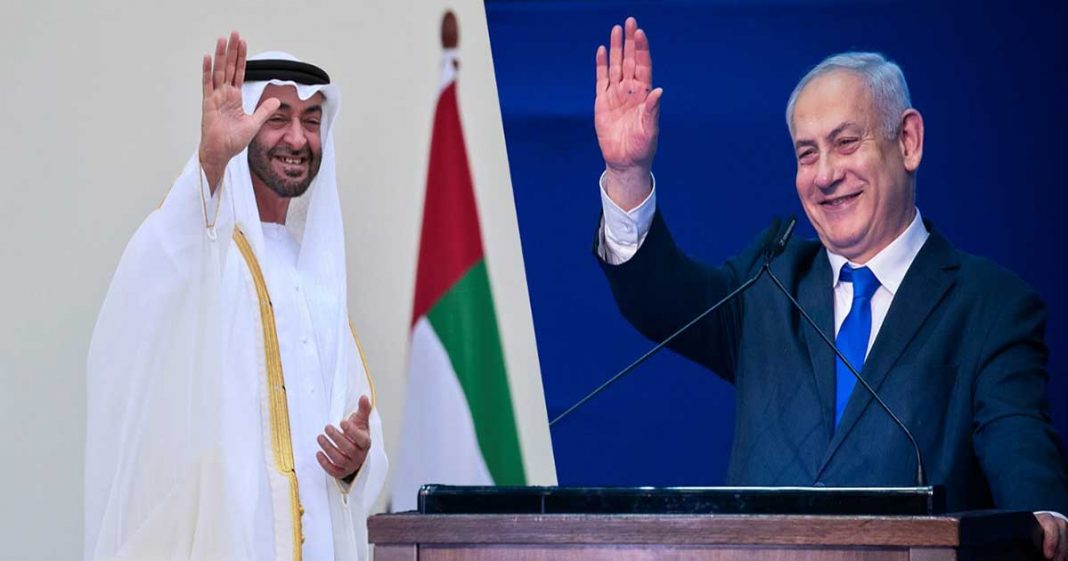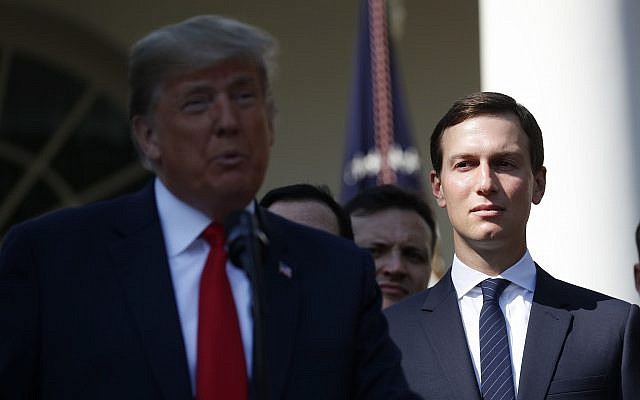In a move that has jolted Middle East’s geopolitics, on August 13, 2020, the United Arab Emirates (UAE) decided to ‘recognise’ the State of Israel, and establish diplomatic and economic relations between the two countries. And with, in no uncertain terms, UAE has formally acknowledged its (hitherto latent) betrayal of the Palestinian cause.
‘Deal’ between the UAE and Israel
In many ways, this ‘deal’ between the UAE and Israel, signed under the auspices of Donald Trump, is not a tectonic shift in UAE’s policy towards Israel; instead, it is merely an admission of the existing relations between the two. The only thing that has changed is that UAE no longer cares to hide them.
It is important to note that informal relations between UAE and Israel had already strengthened over recent years, as the two engaged in extensive ‘unofficial’ cooperation to counter Iran’s nuclear ambition and regional influence. To this end, Israel had already opened an ‘official diplomatic mission’ in Abu Dhabi, for the International Renewable Energy Agency, back in 2015. To this end, in January 2016, Israel’s Energy Minister visited the UAE at the site of International Renewable Energy Agency headquarters in Abu Dhabi. And in April 2019, Israel announced that it had been invited to take part in Dubai Expo 2020.
Read more: What makes Jerusalem so holy & Trump’s deal ludicrous
UAE’s change of heart
But, even amidst this strengthening of ‘informal’ ties and back-door diplomacy, UAE had stopped short of formally recognising the (illegal) State of Israel. It was feared that the ‘Arab street’ would not accept such a move; that it might trigger a new ‘spring’ across the Oil-rich UAE, destabilising Israel-sympathetic dictators and adding to the chaos of the Middle East.
So, what has changed, prompting UAE to break (sacred) tradition in recognising Israel? Is the move aimed at merely spiteing Iran, and strengthening the ‘anti-Shia’ alliance in the Middle East? Is it part of the larger ‘great game’ that has resulted from collapse of a unipolar world? Or is it, instead, merely a ‘favour’ being extended to Donald Trump’s quavering presidential campaign, which desperately needed a big ‘foreign policy win’?
To this end, prompted by the US-Israel nexus, UAE went so far as to bestow its ‘highest civilian award’ to Narendra Modi, in the immediate aftermath of India’s annexation of Kashmir and resulting imposition of an unending curfew on the Kashmiri people
The simplest and most tangible reason: Iran.
During the first term of the Obama Administration, in 2009, the UAE and Israeli ambassadors to the United States made a “joint appeal”, urging the Obama Administration to adopt a tougher stance against Iran. Ignoring this appeal, President Obama signed the ‘Joint Comprehensive Plan of Action’ (JCPOA), lifting sanctions against Iran in exchange for Iran’s removal of two-thirds of its installed centrifuges and 98 percent of its current uranium stockpile. Neither the UAE, nor Israel, supported this deal.
Thereafter, in September of 2012, Foreign Minister of UAE, Abdullah bin Zayed Al Nahyan, met with Israeli Prime Minister Netanyahu to highlight the ‘threat of Iran’; however, at this meeting, UAE refused to formally establish diplomatic relations with Israel, till such time that tangible progress was made on the Israel-Palestine peace process.
In continuation of this dialogue, in 2015, Israeli Ambassador to the United States met with his counterpart from UAE, and encouraged UAE to ‘take a more active role’ in opposing the JCPOA that had resulted in the lifting of sanctions against Iran.
Read more: UAE-Israel Deal: Pakistan reaffirms support to Palestinians
Cooperation between UAE and Israel
This ‘cooperation’ between UAE and Israel, as part of ‘anti-Iran’ lobby, continued throughout President Obama’s second term, as United States intelligence agencies tracked ‘phone communication’ between leaders of the UAE and Israel, along with a meeting in Cyprus, which focused on ‘cooperation against Iran’.
This ‘anti-Iran’ cooperation between UAE and Israel received a much-needed boost when Donald Trump was elected as the 45th President of the United States. Almost immediately, Israel and UAE started lobbying for an accord between the United States and Russia to contain Iranian influence in Syria. To this end, in June 2017, leaked emails revealed that the UAE and Saudi Arabia had been (unofficially) cooperating with Israel to curtail Iran’s influence in the region.
These emails also revealed UAE’s sponsorship of a pro-Israel neocon think tank, Foundation for Defence of Democracies (FDD), which was using its influence in the Trump Administration “to find ways of hampering Iran’s ability to engage in business activities with major companies around the world”.
Why rock the Middle East now, in the midst of COVID-19 pandemic and a debilitating slump in the oil market and tourism sector?
Mutual friendship with USA
But UAE’s cooperation with Israel does not merely stem from a mutual opposition to Iran; it is not restricted to the logic of ‘enemy’s enemy is a friend’. In equal part, it is also propelled by a mutual friendship with, and patronage from, the United States: ‘friend’s friend is also a friend’.
To this end, the UAE’s relationship with the United States (or is it subservience to the United States?) is no secret to the world. Former US National Security Advisor, Richard Clark, has referred to UAE as United States “best counter-terrorism ally in the Gulf”. Former Secretary of Defence for the United States, James Mattis, has nicknamed UAE as “Little Sparta”, for playing an active role in securing the United States’ interests in the region. And the most important of these ‘interests’, is support of Israel against all inimical forces.
In fact, so deep is ‘Little Sparta’s’ alignment with the United States and Israel that, from time to time, it flows over into adjoining relationships. To this end, prompted by the US-Israel nexus, UAE went so far as to bestow its ‘highest civilian award’ to Narendra Modi, in the immediate aftermath of India’s annexation of Kashmir and resulting imposition of an unending curfew on the Kashmiri people.
Read more: Israel-India nexus: History reveals an Anti-Islamist alliance
No surprise at UAE recognising Israel
In this backdrop, no one should be really surprised that the UAE has recognised Israel. Sadly, the UAE, despite all its oil and wealth, has never stood with persecuted Muslims of the world—be it in Gaza, the West Bank, or Kashmir.
But the timing of this move is of great significance. Why rock the Middle East now, in the midst of COVID-19 pandemic and a debilitating slump in the oil market and tourism sector? Well, there is no ‘logical’ reason for it. Except one, perhaps: to provide a critical foreign policy victory to Donald Trump, a few months before the American Presidential elections.
In no uncertain terms, this was UAE’s contribution to Trump’s reelection campaign; even it spells a reneging on decades of Palestinian resistance. Because in a fast-shifting international balance, the survival of UAE’s monarchs is directly dependent on US-Israeli support.
This our policy. And today, more so than ever before, it must be reinforced as part of our allegiance to the persecuted people of Palestine (and by extension, Kashmir)
UAE diplomatic ties with Israel are farcical at best
To this end, the excuse or ‘condition’ provided by UAE for establishing diplomatic ties with Israel is farcical at best: that Israel will (temporarily) ‘suspend’ its plans to annex the West Bank. The reason is a sham for one simple reason: in light of COVID-19 and the advent of a new ‘Cold War’, Israel’s plans to annex the West Bank were in any case ‘suspended’.
Having missed the July 1st deadline for ‘Deal of the Century’, there is no imminent deadline or plan for West Bank’s annexation. So, the UAE has recognised Israel in exchange for (temporarily) maintaining the status quo, which Israel was going to do in any case. Bravo!
Pakistan, in these troubling times, needs to reiterate its state policy clearly. Our state policy on Israel, as recently enunciated by Prime Minister Imran Khan in his visit to the United States is this: “Pakistan has a very straightforward position… that there has to be a just settlement, a home for Palestinians, before Pakistan can recognise Israel.”
Read more: Trump’s Middle East peace plan: Deceit of the century?
In all likelihood, this policy will continue to have consequences for Pakistan in the Western world, led by the US-Israeli nexus. Be that as it may, this policy reflects generations of commitment, a consistent belief in the right to self-determination by Palestinian people and, above all, a recognition of the tremendous cruelty being inflicted by Israel on the displaced Palestinians.
This our policy. And today, more so than ever before, it must be reinforced as part of our allegiance to the persecuted people of Palestine (and by extension, Kashmir).
Saad Rasool is a lawyer based in Lahore. He has an LL.M. in Constitutional Law from Harvard Law School. He can be reached at saad@post.harvard.edu, or Twitter: @Ch_SaadRasool. This article originally appeared at The Nation and has been republished with the author’s permission. The views expressed in this article are the author’s own and do not necessarily reflect the editorial policy of Global Village Space.














